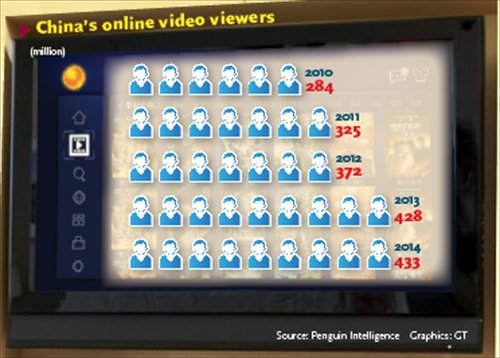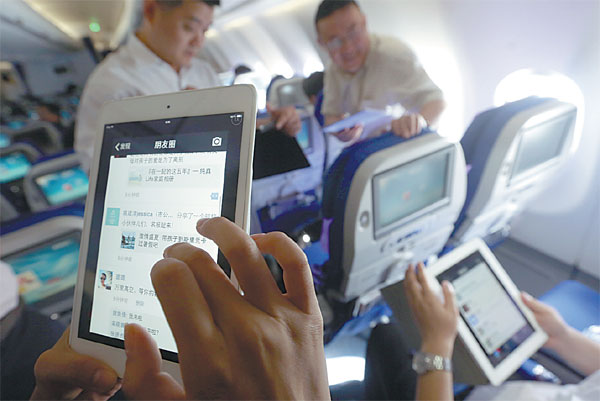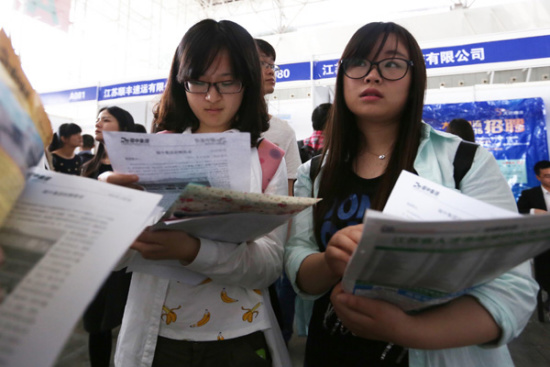Alibaba to launch video service
June 16th, 2015
Company aims to create China's equivalent of Netflix
Chinese e-commerce giant Alibaba Group Holding is set to launch streaming video service in two months, a PR representative from the company told the Global Times on Monday, without elaborating on how the service will operate.
Alibaba is not yet ready to announce whether the service will be offered through Internet set-top box or online video platform, the staff said, noting that more details will be disclosed in a month.
Liu Chunning, president of Alibaba's digital entertainment business group, was quoted by Reuters on late Sunday that the online streaming video service will be named as TBO (Tmall Box Office), aimed at redefining home entertainment and creating the Chinese equivalent of HBO (Home Box Office Inc) and Netflix Inc.
As an affiliate of US media and entertainment group Time Warner Inc, HBO focuses on pay-television and subscription video on demand service, according to the company's website. And over 62 million subscribers of Netflix can watch more than 100 million hours of TV shows and movies per day on nearly any Internet-connected screen via a set-top box, according to Netflix's website.
Contents streamed on TBO are expected to be bought from China and other markets, and the in-house productions will also be an option, according to Liu.
Alibaba has been pushing its digital and entertainment strategy since 2014. Alibaba Investment, an investment arm of Alibaba Group, announced purchase of a 60 percent stake in ChinaVision, later renamed as Alibaba Pictures Group, for the price of HK$6.24 billion ($803.7 million) in March 2014, which was seen as a step to explore the cultural and digital entertainment sector.
In July 2014, Alibaba, which had bought 16.5 percent of Youku Tudou's shares in April 2014, announced a tie-up with U.S. entertainment company Lions Gate Entertainment Corp to gain access to the U.S. partner's TV shows and movies.
The launch of TBO is believed to be another big move in Alibaba's digital and entertainment strategy.
But analysts said that the operation of TBO, either as an online video platform or set-top box, will be challenging for the e-commerce giant.
"If Alibaba is considering developing Internet set-top box, the company's priority should be to figure out how to cooperate with a government-approved license provider," Lu Jingyu, an analyst from Beijing-based market research consultancy iResearch, told the Global Times Monday.
The State Administration of Press, Publication, Radio, Film and Television (SARFT) requires Internet TVs and set-top boxes to only have access to online content provided by seven licensed providers, which are mainly State-owned companies such as China Network Television, BesTV New Media Co and Wasu Media, according to a document released by the country's top media watchdog in October 2011.
The SARFT held talks with major online video websites in September 2014, setting a deadline within the month for them to remove their TV apps.
"Such moves hindered the opening of the Chinese Internet TV service," and affected online video platforms and set-top box developers, said Lu.
According to the Reuters report, about 90 percent of Alibaba's online contents would be paid for, either on show-by-show or monthly subscription basis.
"It is a bold move for Alibaba to charge fees for the majority of its online content, as most Chinese people enjoy free online videos, and online video providers like Baidu's iQiyi and Youku Tudou mainly make money from advertisements," Luo Lan, an analyst from Beijing-based market research firm Analysys International, told the Global Times Monday.
A survey of 17,909 Internet users in February by Penguin Intelligence, a research arm under Tencent Holdings, showed that over 75 percent of the participants frequently watched online videos. However, only 20 percent of the participants said they intend to pay for online content.
Three major Chinese airlines to provide in-flight WiFi services
June 8th, 2015
Passengers use WiFi services to surf Internet on mobile gadgets on a flight of China Eastern Airlines.
Three major Chinese airlines, including China Eastern Airlines, China Southern Airlines and Air China, have been approved to provide in-flight Wi-Fi services.
Passengers on these airlines won't have long to wait before they can log on and stay plugged-in during their flights.
China Eastern Airlines has become the first Chinese carrier to provide Wi-Fi services on both domestic and international flights.
According to the Ministry of Industry and Information Technology, the carrier is allowed to use the AsiaSat-6 satellite for Wi-Fi services on its 21 aircraft from June 5.
The services are expected to be offered in a month as the airline clears up several formalities ahead of the launch.
Zhang Chi, deputy director of the company's transition department, explains what this means for the airline.
"According to our market research, over 86 percent passengers will take flights with internet services as a priority. So providing wifi service is an important strategy for the company to attract passengers, and that's why we've decided to make this a standard service in our entire fleet. To make it happen, over 70 aircraft will be modified to install the necessary equipment before 2017."
After the installation is completed, through the AsiaSat-6 satellite, airplanes in the sky can get connected with network devices in base stations on the ground.
China Southern Airlines' senior engineer Mi Jisheng says the state-to-the-art technology enables air passengers to experience faster wifi service on plane than even at home.
"First, with the new technology, the bandwidth will be about 50-fold faster than that of the previous traditional technology. Second, the communication network will be much larger than before, and this time with global coverage. About 99 percent of intercontinental routes will be covered with satellite signals."
Currently, American Airlines, Qatar Airlines and many other foreign airlines offer wi-fi services on flights, with charges ranging from several US dollars to over twenty dollars.
However, Zhang Chi with China Eastern Airlines says their service charges are expected to be free.
"Through wifi access, we will offer a variety of internet services which are free for passengers. The service charges will be shared and paid by the airline and its business partners. We have collaborated with China Union Pay for passengers on the plane to make real-time payment through a cloud platform, which is a breakthrough for online shopping during flights."
With the commercialization of the service, passengers on plane can also enjoy a wide range of duty-free goods.
Experts predict the Wi-Fi service could bring about new business opportunities, especially in social media and data services.
Last year, around 390 million domestic Chinese passengers took flights and spent 1 billion hours in the air.
VAT net to be widened to realty, finance and consumer services
June 5th, 2015The government is likely to come out with a fresh value-added tax reform plan for the real estate, finance and consumer-oriented services industries next month, ending the three-year reform on all service industries, according to unconfirmed reports.
The Ministry of Finance is believed to have already drafted the plan and the same would be announced after approval from the State Council, the cabinet, Xinhua-affiliated Economic Information Daily said on Thursday, quoting unidentified people close to the ministry.
Even if the plan is sent to the State Council this month and approved in July, it would take another few months to finalize the implementation mechanism. So in all probability, the reforms are likely to be implemented by the end of this year, the sources said.
VAT rate for the real estate sector may be set at 11 percent, and for finance and consumer-oriented services industry at 6 percent, the report said. The ministry declined requests to confirm the report.
China started a pilot program to replace business tax with VAT in January 2012 in an effort to avoid double taxation, ease companies' tax burden and encourage the service sector. Reforms have already been implemented in sectors such as transportation, telecommunication and modern services, with real estate, finance and consumer-oriented services the only three sectors untouched.
Policymakers intend to wrap up the reforms this year. It is the debate over some specific issues that has hampered the progress. Among all technical challenges, "credit mechanism" is a focal point, experts said.
The VAT only taxes the "value added" at each stage of the supply chain, which generally allows businesses to credit tax incurred on business-related purchases. The VAT rate is generally higher than the current business tax. Any failure to "credit business expenses might actually increase the tax burden", which is contrary to what the policy intends to achieve.
"VAT invoices may not be readily available for some purchases, therefore the claiming of input VAT credit for the purchases may be limited. Besides land, major cost for developers will likely be raw materials (brick, lime, sand, stone, etc.) and labor. Suppliers of these may be individuals, or small business owners, who may not be able, or may have difficulty in issuing VAT invoices," said Alan Wu, national indirect tax leader at PricewaterhouseCoopers China.
The reforms also pose challenges to the projects that are under construction, or those where construction is completed but the sale is still going on, as it would be impossible to get input VAT invoices for the cost already incurred for credit claims. Since the applicable tax rate might be 11 percent and the current business tax rate is 5 percent, the costs would certainly go up, Wu said.
"A transitional measure might be more helpful to address these difficulties," Wu said.
For the finance industry, controversies are greater. Most countries exempt VAT on financial products. Kenneth Leung, indirect tax leader at Ernst & Young Greater China, said financial services subjected to VAT could be divided into three categories: Interest, earnings from financial trading, and service fees. According to the current policy discussions, the VAT charged on interest expenses and financial products might not be creditable as input VAT temporarily.
However, Wu said the reform will be less effective if any part of the chain is broken (input VAT not creditable), or if VAT on interest is not allowed as input credit. Regarding application of VAT to financial trading, one possible way out would be to continue the current net basis arrangement under business tax, while allowing a net negative position to be carried forward, without limitation, to offset against future positive position.
Gender balance remains elusive
June 4th, 2015
University students at a job fair in Nanjing, capital of Jiangsu province. Women are less likely than their male co-workers to believe that pay equality and equal opportunities exist for both genders in the workplace, a survey shows.
Although progress has been made, equality between male and female professionals remains a critical issue in China.
According to a survey released by global recruitment specialist group Hays on Tuesday, women are less likely than their male co-workers to believe that pay equality and equal opportunities exist for both genders in the workplace.
Hays polled 521 professionals in China, 55 percent of whom were female. Only 7 percent of women aged 25 or under think there is gender inequality of pay. But as they progress in their career, that number increases. About 29 percent of women aged between 26 and 40, and 35 percent of women aged 41 or above think there is gender inequality of pay.
In general, transport and distribution, mining and resources, as well as professional services, drew the most negative answers among both male and female professionals concerning equal pay.
But the majority of polled men think that the situation is not that bad, as only 13 percent of them think that equally capable men and women are not paid or rewarded equally.
"This suggests that most people in executive and senior management roles?the majority of whom are men?still fail to see any inequality when it comes to pay and career opportunities between the sexes. This makes it difficult to see how we will see any significant advancement in this area while the majority of people in senior roles do not recognize it as an issue," said Christine Wright, managing director of Hays in Asia.
In terms of career opportunities, 64 percent of the respondents think that the same career opportunities are available regardless of gender. But when it goes deeper down to study the answers of each gender, it is found that 47 percent of the women said that the same career opportunities were not open to equally capable colleagues of both genders, while only 24 percent of the male interviewees responded similarly.
However, the results in the Chinese market were better than the global average. But this is not a result of Chinese companies' spontaneous efforts to improve workplace equality. The incredible pace of growth in China and the skills shortage in the job market mean that "the country does not have the luxury to discriminate by gender", said Wright.
But it cannot be denied that most companies in China have been supportive of gender diversity policies. About 60 percent of the respondents working in the financial services sector said their companies have a gender diversity policy in place, followed by construction, property and engineering, and information technology and telecommunications.
Lawrence Lee, human resources vice-president for greater China and Mongolia at Hilton Worldwide, said that the company has networking and mentoring programs for female staff, as well as gender equality in its Leadership Committee dedicated to better understanding the needs of female employees. Reflecting the result of Hilton's efforts in this regard is the fact that 51 percent of the leadership positions in China are now held by women.
Wealthy Chinese lift travel spending
June 3rd, 2015Wealthy Chinese spent more on traveling last year with interest in experiential travel emerging as a new trend, a survey has found.
They spent U.S.$58,000 in average household consumption on travel last year, an increase of 5.5 percent year on year, according to the Chinese Luxury Traveler 2015 jointly released by the Hurun Research Institute and ILTM Asia. Their expenditure per capita hit U.S.$22,600.
The wealthy spent an average of 20 days on travel during the year, up 10 percent or two days more than 2013, according to the report which surveyed 291 super rich travelers, or those who spent U.S.$30,000 or more on travel last year.
Australia was the top destination for the wealthy Chinese, with France in second spot. The Maldives came in third in the preferred international luxury travel destinations, followed by Dubai, the survey found.
Leisure trips, polar exploration and global travel were cited as top choices last year, the report said.
The North Pole and South Pole have become popular as one third of the respondents said they went to either place last year, spending an average of U.S.$19,300 per capita.
"The recent popularity of Antarctica for the Chinese luxury travelers shows how much experiential travel is now on the cards," said Rupert Hoogewerf, Hurun's founder.
The report predicted holiday themes to change among the luxury travelers to enjoying local life and culture as well as novel and extreme challenging experiences.
Domestically, Sanya in Hainan Province, Tibet and Hong Kong were the most popular destinations for luxury travelers, the survey found.
Average new home price rises slightly in May
June 2nd, 2015More cities nationwide witness increase compared to April
The average new home price in China's 100 major cities increased by 0.45 percent month-on-month in May mainly due to the central government's policy support, data from a property research firm showed Monday.
Analysts expected the recovery to continue in the second half of 2015.
The average new home price in the 100 cities rose to 10,569 yuan ($1,705) per square meter in May from 10,522 yuan per square meter in April, which was a 0.01 percent month-on-month drop, according to a report released by property research firm China Index Academy (CIA) on Monday.
Moreover, 48 cities out of the 100 saw monthly price growth in May compared to 39 in April. The other 52 cities had monthly home price drops in May, while 60 cities had month-on-month price falls in April, the CIA report said.
"The real estate sector recovered in April and this development continued in May, thanks to the authorities' supportive policies, especially the new mortgage policy issued at the end of March," Gu Yunchang, deputy head of the China Real Estate and Housing Research Association, told the Global Times on Monday.
A joint notice on March 30 from the People's Bank of China (PBC), or the central bank, the Ministry of Housing and Urban-Rural Development and the China Banking Regulatory Commission eased mortgage conditions for second-home buyers and waived transactions taxes on apartment sales.
Afterward, Beijing announced lower down payment requirements for first-time buyers and easier conditions for second-home purchases, which took effect on Monday.
The PBC has also cut interest rates three times since November 2014, lowering homebuyers' financing costs.
Gu said these policies not only lowered the threshold for homebuyers but also gave them confidence in property transactions.
However, the recovery is more obvious in the first- and second-tier cities while third- and fourth-tier cities are still in the process of selling their large home inventories, Zhang Hongwei, research director at Shanghai-based property consultancy ToSpur, wrote in a research note sent to the Global Times on Monday.
"For the whole market, especially in small and medium-sized cities, there will not be a home price surge like what we saw in 2009 due to the remaining inventory of homes as well as the current supply and demand situation," Gu said, noting destocking should be property developers' top task instead of charging high prices blindly.
He also predicted that the property market may perform better in the third quarter of this year.
Zhang said transactions will increase in June because besides supportive policies, property developers, especially the listed ones, will try harder to promote sales in June to meet mid-year sales goals.